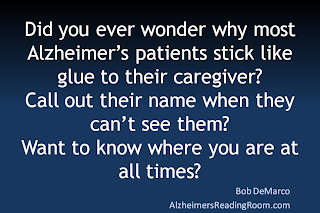Is there an article which explains what is happening in the brain that gives dementia patients times of lucidity, and times of confusion, and times of both?
Our reader Helen sent me a really interesting question:
Is there an article which explains what is happening in the brain that gives dementia patients times of lucidity, and times of confusion, and times of both?
This is an interesting and thought provoking question. I bet millions of Alzheimer's caregivers have thought about this question.
By Bob DeMarco
Alzheimer's Reading Room
Think about it.
Take me for example. I'm always searching for the holy grail. I recently passed the 8 year mark for caregiving.
The Best Way to Find Solutions to the Problems that Caregivers Face Each Day
I don't know of any specific research that answers Helen's question.
I do know some of the things that makes Dotty "more there" and "very dull".
There can be little doubt that exercise increases blood flow to the brain. Does increased blood flow to the brain help cause moments of lucidity, you betcha. Before exercise Dotty might be dull and firmly entrenched in the "NO" world. Afterward, she looks taller, seems more in control of her own world, smiles and talks.
Dotty often goes into dull world around 4 in the afternoon or there abouts. What works best? Bright light.
We live in Florida so light is no problem. I try to take Dotty out into the bright light every day (late afternoon, early evening). More recently, I have been putting Dotty and Harvey outside for some chips and ice tea. We have good light right out front, and its covered so your brain won't fry.
We also use Walmart for bright light and to get Dotty around other people. We use the motorized cart to get around the store. I am a big fan of the cart. Dotty has to use her hands in combination with her brain, and has to navigate. Amazingly, Dotty can still navigate around right behind me in the cart with little problem. She never runs into anything. She doesn't look at the food as much as she use to. Or, try to snag a box of Cheese Its like she use too. That is a bit disconcerting. Of course, it was also disconcerting when she was doing it.
One of the most interesting aspects of Alzheimer's caregiving is Yin and Yang. Especially when Yin turns into Yang, and Yang turns into Yin over time. Odd, how I can miss a "Dotty behavior" when she stops doing it. The same behavior use to bug me when she would do it.
Bright light clearly improves Dotty's mood. It also keep her from the very common "sundowning" behavior. It is not unusual for persons living with Alzheimer's to get mean, dull, and often disconcerted around sundown. Also confused.
Tip. If sundown causes challenging behavior, it only stands to reason that sun-up is the solution. I mean bright light. It is also helpful to introduce bright light into the entire day. Open the curtains, sit near the window, or outside. Let the sun shine in (sing it).
I really don't understand why there isn't more research on bright light. Almost everyone I know that tries "bright light" says it works. Bright light gets you "more there", instead of "less there". Which does qualify as a form of "lucidity" in my opinion.
There can be little doubt that Harvey, our repeat parrot, brings moments of lucidity. One thing for sure, Harvey gets more information out of Dotty than I can get. I continue to believe that the repeat parrot is the number one caregiver tool. See, Toy Improves Mood and Behavior in Alzheimer's Patient.
Music undoubtedly brings the "more there". Put the music on the television if you have the music channel, or a good music movie like Shrek, or Mama Mia. Watch the face of the person living with dementia. You might actually see them begin to pay attention to the television, instead of that dull I have no idea what is on television look.
Sometimes something comes on the television by accident, like Sesame Street where they are singing and you have lots of bright colors. Dotty really perks up, she looks mesmerized with interest, and starts to pay attention. How often do you see that look?
Television is a good baby sitting tool, it is not a good Alzheimer's caregiving tool. In fact, too much TV will bring on the "dull" faster that a speeding bullet.
Painting and jigsaw puzzles bring on the "more there" for certain.
So here is the deal.
If you engage the person living with dementia, keep them socialized, get a parrot, use music, puzzles and large doses of bright light along with lots of "real" exercise and a good diet, you just might get more lucid moments.
I have not yet discovered that one single thing that brings the "rain". Those wonderful lucid moments that make the heart soar.
I won't give up though. Not ever. If there is a holy grail of Alzheimer's caregiving, I want to find it. Or, find the person that knows where it is.
I remain convinced that the main reason Dotty continues to surprise me from time to time, with moments of lucidity, is a direct result of doing every thing I can think of to keep her engaged and living her life.
Subscribe to the Alzheimer's Reading Room |
Related Articles
What is the Difference Between Alzheimer's and Dementia
How to Test Your Memory
Dementia Care
Memory Care
Bob DeMarco is the Founder of the Alzheimer's Reading Room (ARR). Bob is a recognized writer, speaker, and influencer in the Alzheimer's and Dementia Community worldwide.
You are reading original content the Alzheimer's Reading Room
Why Do the Deeply Forgetful Say No
Many Alzheimer's caregivers accept the word "No" from the deeply forgetful without ever trying to figure out why they do it.
Many Alzheimer's caregivers accept the word "No" from the deeply forgetful without ever trying to figure out why they do it.
S/he says no all the time, the caregiver complains.
It is very common for a person that is deeply forgetful to say "no" when you ask them to do something. I don't know why, but it seems like this is a secret to many in the dementia community even though this is a common occurrence.
I knew for a long time when Dotty said "no" she didn't mean it. Nevertheless, it still drove me crazy, and often made me feel frustrated or angry.
Continue reading -



